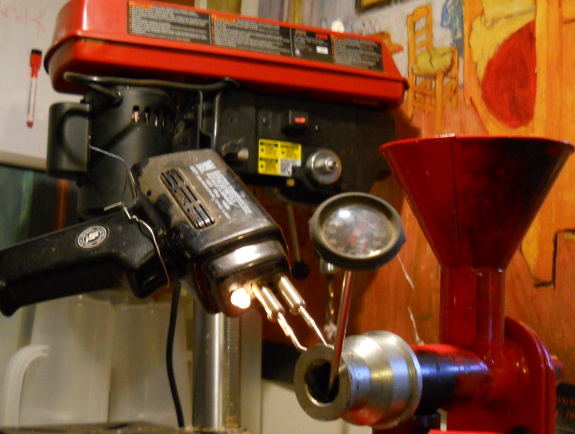
How not to heat a Rajkumar oil expeller
I've been experimenting with
alternative heating methods for the new Rajkumar
oil expeller.
The soldering iron pictured
above failed miserably.
It did a good job of heating
the metal, but those things were never designed to be left on for more
than a minute, which is why it has a push button trigger instead of a
toggle switch. I knew this, but thought it could handle just a few
minutes more. That's when the plastic case around the heating element
melted. Now I need to find a new soldering iron.
The next round of experiments
will involve an electric
pipe heater.
Want more in-depth information? Browse through our books.
Or explore more posts by date or by subject.
About us: Anna Hess and Mark Hamilton spent over a decade living self-sufficiently in the mountains of Virginia before moving north to start over from scratch in the foothills of Ohio. They've experimented with permaculture, no-till gardening, trailersteading, home-based microbusinesses and much more, writing about their adventures in both blogs and books.
Want to be notified when new comments are posted on this page? Click on the RSS button after you add a comment to subscribe to the comment feed, or simply check the box beside "email replies to me" while writing your comment.


I was about to say heat gun, and now I see Justin's already suggested it. The one I worked with in college had a flat plate on top so I could put it down while it was still on. This was handy because I was melting crayons on to a sculpture and then smoothing them out, which really took to hands. ~Molly
A mantle of hot water should do the trick. It doesn't smell, conducts heat well and has a built-in temperature limit as long as you don't pressurize it. Take e.g. a used tin can, make two holes in the sides so you can stick the expeller through it. Seal the holes with silicone. Pour in boiling water and start expelling. Replace the hot water when it cools down too much.
Alternatively, try a small propane, butane or natural gas burner. Those burn without smoke or smell but quite hot. Don't put any flames too close to the paint, though. Unless it's an enamel (glass), the paint (using an organic binder) will burn at some point. But if the expeller gets that hot, the oil will also get too hot and pyrolyse.
Can you put the expeller on top of the stove? Metal-to-metal contact and airflow would then heat it up. It might get too hot, though.
Pre-heating the oilseeds in e.g. a frying pan on top of the stove might make expelling easier. The vicosity of the oil will decrease markedly as the temperature increases.
Mark's been researching, and someone extracts coconut oil by heating up the coconut lightly, then passing it through a juicer. I like that idea the best so far!
(Actually, maybe with preheating, you could send it through the expeller with no heat added? That's probably what you were saying....)
Heating the seeds is probably not nearly sufficient. to heat up the expeller. The specific heat of organics is higher than that of iron, but there is a lot more iron in the expeller than oilseeds!
But pre-heating the seeds would reduce the amount of heat that you need to add to the expeller. But on second thought, it is probably more effort than it is worth.
Clamping the metal base of the expeller to the hot stove might do the trick, though. Iron conducts heat very well. Much better than air or water.
Amazon has a 200 Watt magnetic heater which may be a bit too much: http://www.amazon.com/Kats-1153-Handi-Heat-Magnetic-Heater/dp/B000BOABS6
This link shows the Piteba with an oil pan heater: http://advancedsurvivalguide.com/2011/11/04/piteba-oil-press-pumpkin-seed-trial/
Electrical heaters: http://www.honeywon.com
Engine pad heaters: http://www.engineheaters.co.uk/
Selfadhesive heatermat,50W 100x150mm: http://uk.rs-online.com/web/p/products/0245613/
Touch-Safe Heater 50 to 150 W: http://www.omega.co.uk/ppt/pptsc.asp?ref=CS060_Series&Nav=
Good luck!
Cheers, John
@John's comments are dead on. In industry, we typically use a steam jacket or other large-scale heat source for this, but using an engine pad heater attached to a lamp dimmer will give you an adjustable electric heat source. If you have a hot water or steam source (ie set up a kettle and hot plate/oil burner as a thermosiphon heater) you can wind copper tubing around the housing. Remember that the oil is carrying away heat as it leaves the expeller, so you'll need more heat than intuition would suggest - it's likely that a pipe heater won't do the trick.
If you felt adventurous, you could delve into winding the housing itself for induction heating, but that's not for the faint of heart.